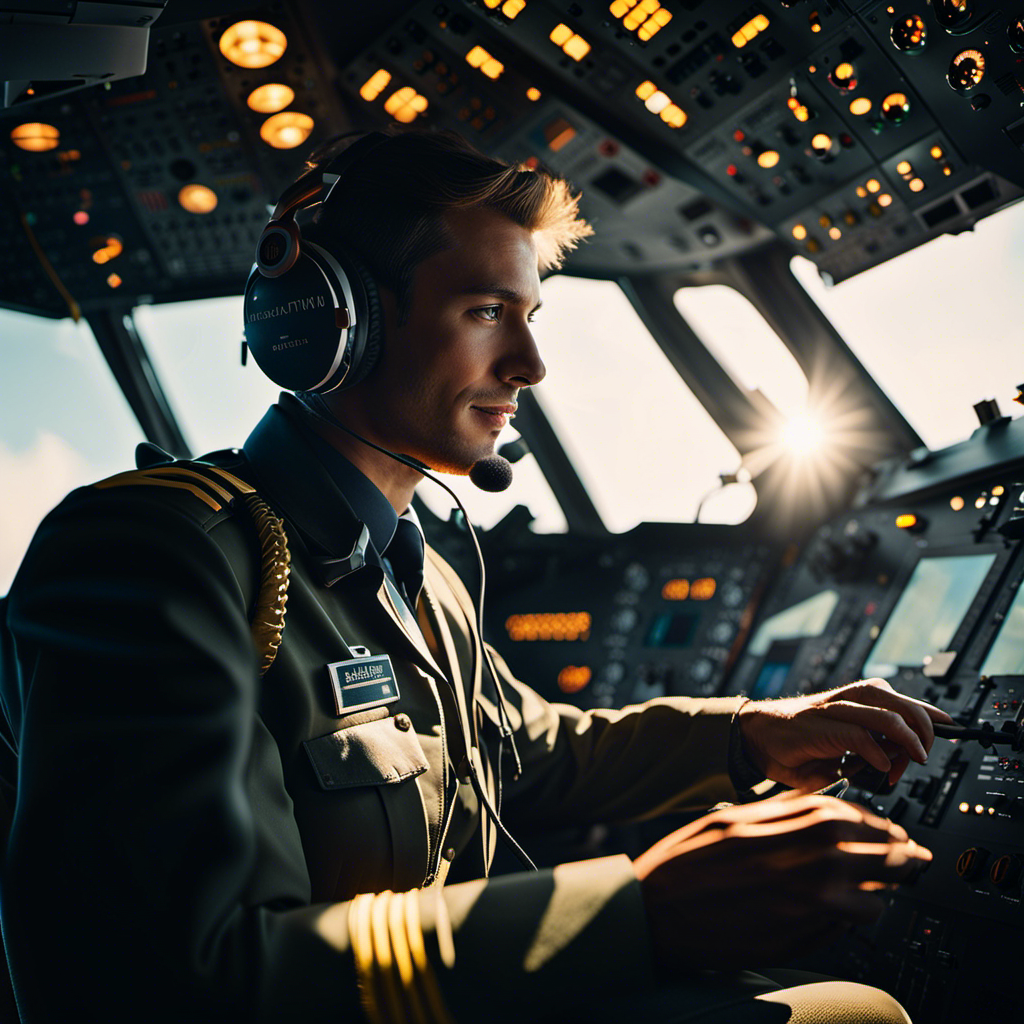As a pilot, I have always been intrigued by the phrase ‘mind over matter’. However, when it comes to the mental health of pilots, it goes beyond just willpower. It is a crucial aspect that is often overlooked.
In this article, we will explore the importance of mental health for pilots, the unique challenges they face, and the common issues they encounter. We will also delve into the support and resources available, the role of airlines in promoting mental health, and the impact on flight safety.
Let’s break the stigma and shed light on this vital topic.
Key Takeaways
- The mental health of pilots directly impacts their job performance and safety.
- Pilots face unique challenges that can affect their mental well-being, including long hours, high stress levels, and constant time zone changes.
- Common mental health issues among pilots include anxiety, depression, and burnout.
- Airlines play a crucial role in promoting pilot mental health through access to resources, counseling services, and a positive work environment.
The Importance of Mental Health for Pilots
You need to prioritize your mental health as a pilot because it directly impacts your ability to perform your job safely and effectively.
As a pilot, I am well aware of the challenges faced in maintaining good mental health. The demanding nature of the job, long hours, high levels of stress, and the need for constant focus can take a toll on one’s mental well-being.
However, it is crucial to understand that support is available. Airlines and aviation organizations have recognized the importance of mental health and have implemented programs to provide assistance to pilots. These programs include access to mental health professionals, peer support groups, and confidential reporting systems.
Unique Challenges Faced by Pilots
As a pilot, I am intimately familiar with the stress of long flights and irregular schedules. The constant time zone changes, lack of sleep, and extended periods away from home can take a toll on both my physical and mental well-being.
The overwhelming responsibility for passenger safety weighs heavily on me. I am responsible for the lives of hundreds of people every time I take to the skies.
Stress of Long Flights and Irregular Schedules
Flying long hours and dealing with irregular schedules can cause significant stress for pilots. As a pilot, I have experienced the exhaustion that comes from spending hours in the air, navigating through different time zones. Coping with jet lag is a constant battle, as it disrupts our sleep patterns and leaves us feeling fatigued.
To manage the challenges of long flights and irregular schedules, here are three strategies that have proven effective for me:
-
Prioritize rest: Getting enough sleep before and after flights is crucial to combatting long flight exhaustion and jet lag.
-
Maintain a healthy lifestyle: Regular exercise and a balanced diet help to boost energy levels and enhance overall well-being.
-
Practice self-care: Engaging in relaxation techniques, such as meditation or reading, can help reduce stress and promote mental clarity.
Navigating the stress of long flights and irregular schedules is just the beginning of a pilot’s journey. It is an overwhelming responsibility to ensure the safety of our passengers, which will be explored in the next section.
Overwhelming Responsibility for Passenger Safety
Ensuring the safety of passengers is an overwhelming responsibility that comes with being a pilot. We are entrusted with the lives of hundreds of people every time we take to the skies. It is a responsibility that weighs heavily on our shoulders, and can take a toll on our mental health.
Pilot burnout is a real concern in the aviation industry. The long hours, irregular schedules, and constant pressure can lead to exhaustion and stress. That’s why psychological screening is an important aspect of pilot training. It helps identify potential mental health issues and provides support to pilots who may be struggling.
Understanding and addressing mental health concerns among pilots is crucial for maintaining a safe and efficient aviation industry.
Transitioning into the next section, it is important to discuss the common mental health issues that pilots face.
Common Mental Health Issues Among Pilots
Pilots often experience common mental health issues. The high-stress nature of their job, coupled with long hours and constant pressure, can take a toll on their mental well-being.
Some of the most common mental health issues among pilots include anxiety, depression, and burnout. Anxiety can manifest as excessive worry and fear, making it difficult for pilots to concentrate and perform their duties effectively. Depression can lead to feelings of sadness and hopelessness, affecting their overall mood and motivation. Burnout, on the other hand, occurs when pilots become emotionally and physically exhausted from the demands of their profession.
Fortunately, there are support and resources available to help pilots cope with these challenges. From confidential counseling services to peer support groups, these resources can provide valuable assistance and guidance to pilots in need.
Transitioning into the next section, it is important to explore the various support and resources available for pilots to ensure their mental well-being.
Support and Resources for Pilots
If you’re feeling overwhelmed or struggling with your well-being, there are numerous support and resources available to help you navigate these challenges. As pilots, we face unique pressures and demands that can take a toll on our mental health. It’s important to have support systems and coping mechanisms in place to ensure our well-being. Here are some resources that can provide assistance:
| Support Systems | Coping Mechanisms |
|---|---|
| Peer support programs | Stress management |
| Employee assistance | Regular exercise |
| programs | Healthy diet |
| Mental health | Mindfulness practices |
| professionals |
These resources can help us address any mental health issues we may be experiencing and provide guidance on how to maintain a healthy state of mind. It’s crucial for us to prioritize our well-being and seek help when needed. Now, let’s explore the role of airlines in promoting pilot mental health.
The Role of Airlines in Promoting Pilot Mental Health
Airlines understand the crucial role they play in promoting the well-being of their pilots. They recognize that the mental health of pilots directly affects the safety and efficiency of their operations. To ensure pilot well-being, airlines have implemented various initiatives.
These initiatives include providing access to mental health resources and support systems, offering counseling services, and organizing workshops on stress management and coping mechanisms. Airlines also prioritize creating a positive work environment that encourages open communication and reduces stigma surrounding mental health.
Strategies for Self-Care and Well-being
When it comes to managing stress and maintaining a healthy lifestyle, there are several techniques and choices that can be beneficial.
First and foremost, finding effective stress management techniques is crucial for overall well-being. Whether it’s through exercise, meditation, or engaging in hobbies, finding what works best for you can help alleviate stress and promote a sense of calm.
Additionally, making healthy lifestyle choices such as eating nutritious foods, getting enough sleep, and staying hydrated can have a significant impact on both physical and mental health.
Stress Management Techniques
Take a few moments each day to practice stress management techniques that can help me as a pilot maintain my mental well-being.
Here are four stress reduction techniques and mindfulness practices that I find helpful:
-
Deep Breathing: I take slow, deep breaths, focusing on my breath as it enters and leaves my body. This helps me calm my mind and relax my body.
-
Meditation: I set aside time each day to sit quietly and meditate. I focus on the present moment, letting go of any thoughts or worries that may arise.
-
Exercise: Engaging in physical activity, such as going for a run or practicing yoga, helps me release tension and boost my mood.
-
Time in Nature: Spending time outdoors, surrounded by nature, helps me recharge and find inner peace.
By incorporating these stress management techniques into my daily routine, I am better equipped to handle the demands of being a pilot.
Transitioning to healthy lifestyle choices, I also make sure to prioritize my physical well-being.
Healthy Lifestyle Choices
After discussing stress management techniques, it is important to address the role of healthy lifestyle choices when it comes to maintaining mental well-being.
As a pilot, I understand the significance of leading a healthy lifestyle in order to cope with the demands of this profession. Healthy eating plays a crucial role in providing the necessary nutrients and energy to sustain mental and physical performance. Incorporating a balanced diet rich in fruits, vegetables, whole grains, and lean proteins can help regulate mood and reduce stress levels.
Additionally, regular exercise routines have been proven to release endorphins, which are known to enhance mood and reduce anxiety. These lifestyle choices contribute to overall mental resilience, allowing pilots to handle the pressures of their job more effectively.
Understanding the impact of mental health on flight safety is vital in ensuring the well-being of both pilots and passengers.
The Impact of Mental Health on Flight Safety
As a pilot, it’s crucial to prioritize mental fitness for the sake of flight safety.
The importance of maintaining good mental health cannot be overstated. It directly affects decision-making, situational awareness, and overall performance in the cockpit.
To address mental health concerns, strategies such as regular check-ins with mental health professionals, peer support programs, and training on stress management techniques can be implemented.
These measures ensure pilots have the necessary resources and support to maintain their mental well-being.
Importance of Mental Fitness for Pilots
Maintaining mental fitness is crucial for pilots to ensure safe and successful flights. A pilot’s well-being is essential not only for their personal health but also for the well-being of the passengers they are responsible for.
To address this, mental fitness programs have been implemented to support pilots in managing the unique stressors they face. These programs aim to enhance emotional resilience and provide coping strategies for the demanding nature of their profession. By offering resources such as counseling services, peer support groups, and stress management workshops, pilots can effectively navigate the challenges that come with their job.
It is imperative that pilots prioritize their mental well-being to maintain optimal performance and make sound decisions in the cockpit.
Transitioning into strategies for addressing mental health concerns, pilots can adopt various tools and techniques to proactively manage their mental fitness.
Strategies for Addressing Mental Health Concerns
Remember, it’s important to prioritize your well-being by implementing strategies to address any mental health concerns you may have.
When it comes to addressing mental health concerns, there are several strategies that can be effective. First and foremost, seeking professional help is crucial. A mental health professional can provide guidance and support, helping you navigate through any challenges you may be facing.
Additionally, self-care practices such as exercise, mindfulness, and adequate sleep can greatly contribute to your overall mental well-being. It’s also essential to establish a strong support system of family, friends, or colleagues who can offer understanding and encouragement.
By actively implementing these strategies, you can take proactive steps towards maintaining good mental health.
Now, let’s discuss the importance of breaking the stigma surrounding mental health in aviation.
Breaking the Stigma Surrounding Mental Health in Aviation
You can help break the stigma surrounding mental health in aviation by openly discussing and supporting pilots’ mental well-being. By breaking barriers and destigmatizing mental health, we can create a culture where pilots feel comfortable seeking help and support when needed. It is crucial to recognize that pilots, like anyone else, can experience mental health challenges. To shed light on this important issue, let’s take a look at the following table that highlights the benefits of addressing mental health in aviation:
| Benefits of Addressing Mental Health in Aviation |
|---|
| Enhanced safety and performance |
| Improved pilot well-being |
| Increased awareness and understanding |
| Strengthened support systems |
These benefits demonstrate the positive impact of addressing mental health in the aviation industry. By prioritizing mental well-being, we can create an environment that encourages open and honest discussions about mental health challenges. This lays the foundation for the subsequent section, where we will explore case studies and personal stories, providing further insight into the importance of supporting pilots’ mental health.
Case Studies and Personal Stories
Let’s take a closer look at some case studies and personal stories to gain a deeper understanding of the impact of mental health on pilots in the aviation industry.
-
Case Study 1: John, a seasoned pilot, struggled with anxiety and depression. He found it difficult to concentrate during flights and experienced panic attacks. With proper treatment and support, he was able to overcome these challenges and continue his career as a pilot.
-
Personal Experience 1: Sarah, a commercial pilot, shared her experience with burnout. Long hours, constant pressure, and lack of work-life balance took a toll on her mental health. Taking breaks and practicing self-care helped her regain her passion for flying.
-
Case Study 2: Mark, a pilot with PTSD, faced flashbacks and nightmares related to a past traumatic event. Through therapy and support from his airline, he learned coping mechanisms to manage his symptoms and maintain his performance.
-
Personal Experience 2: Emily, a pilot-in-training, spoke about the stress and anxiety she faced during rigorous flight training. She emphasized the importance of open communication and seeking help when needed.
These case studies and personal experiences highlight the diverse ways in which mental health can impact pilots in the aviation industry.
Now, let’s move on to the conclusion and call to action, where we will discuss the importance of addressing mental health in this profession.
Conclusion and Call to Action
After examining the case studies and personal stories of pilots who have experienced mental health challenges, it is clear that there is a pressing need for strategies to destigmatize mental health and promote mental wellness in the aviation industry.
The stories shared by pilots highlight the importance of creating an environment where individuals feel comfortable seeking help and support without fear of negative consequences.
To address this issue, several strategies can be implemented. First, airlines should prioritize mental health education and awareness among pilots, providing them with the tools and resources to recognize and address their own mental health needs.
Additionally, implementing regular mental health check-ins and providing confidential counseling services can help pilots proactively manage their mental wellbeing.
Finally, fostering a culture of support and understanding within the aviation community can play a pivotal role in reducing the stigma surrounding mental health and encouraging pilots to prioritize their mental wellness.
Frequently Asked Questions
What are the specific mental health issues that pilots commonly face?
Pilots commonly face mental health issues such as stress and anxiety due to the demanding nature of their job. They often rely on stress management techniques and coping mechanisms to maintain their well-being.
How do airlines support pilots in maintaining their mental health?
Airlines take pilot mental health seriously and have implemented various initiatives and pilot support programs. These programs include regular mental health check-ins, confidential counseling services, and stress management workshops to ensure pilots maintain their well-being.
What strategies can pilots use to take care of their mental well-being?
Pilots can take care of their mental well-being by utilizing pilot support systems and participating in mental health awareness campaigns. These strategies provide resources and education to help pilots prioritize their mental health and seek support when needed.
How does mental health impact flight safety?
Mental health plays a crucial role in flight safety. Stress can impair decision-making and reaction times. That’s why mental health training is important for pilots, ensuring they can maintain optimal performance in high-pressure situations.
Can you provide any personal stories or case studies about pilots and their mental health struggles?
In a recent survey, it was found that 12% of pilots reported experiencing mental health issues. Personal stories and case studies highlight the struggles pilots face, emphasizing the importance of airline support and strategies for their mental well-being, crucial for flight safety.
Conclusion
In conclusion, the mental health of pilots is a vital aspect that cannot be overlooked. Just like the intricate mechanics of a plane, a pilot’s mind must be well-maintained and in optimal condition. Ignoring mental health issues can have disastrous consequences, akin to flying through a turbulent storm without a compass.
It is imperative that airlines prioritize the well-being of their pilots, providing them with the necessary support and resources. By breaking the stigma surrounding mental health in aviation, we can create a safer and more compassionate industry for all.









